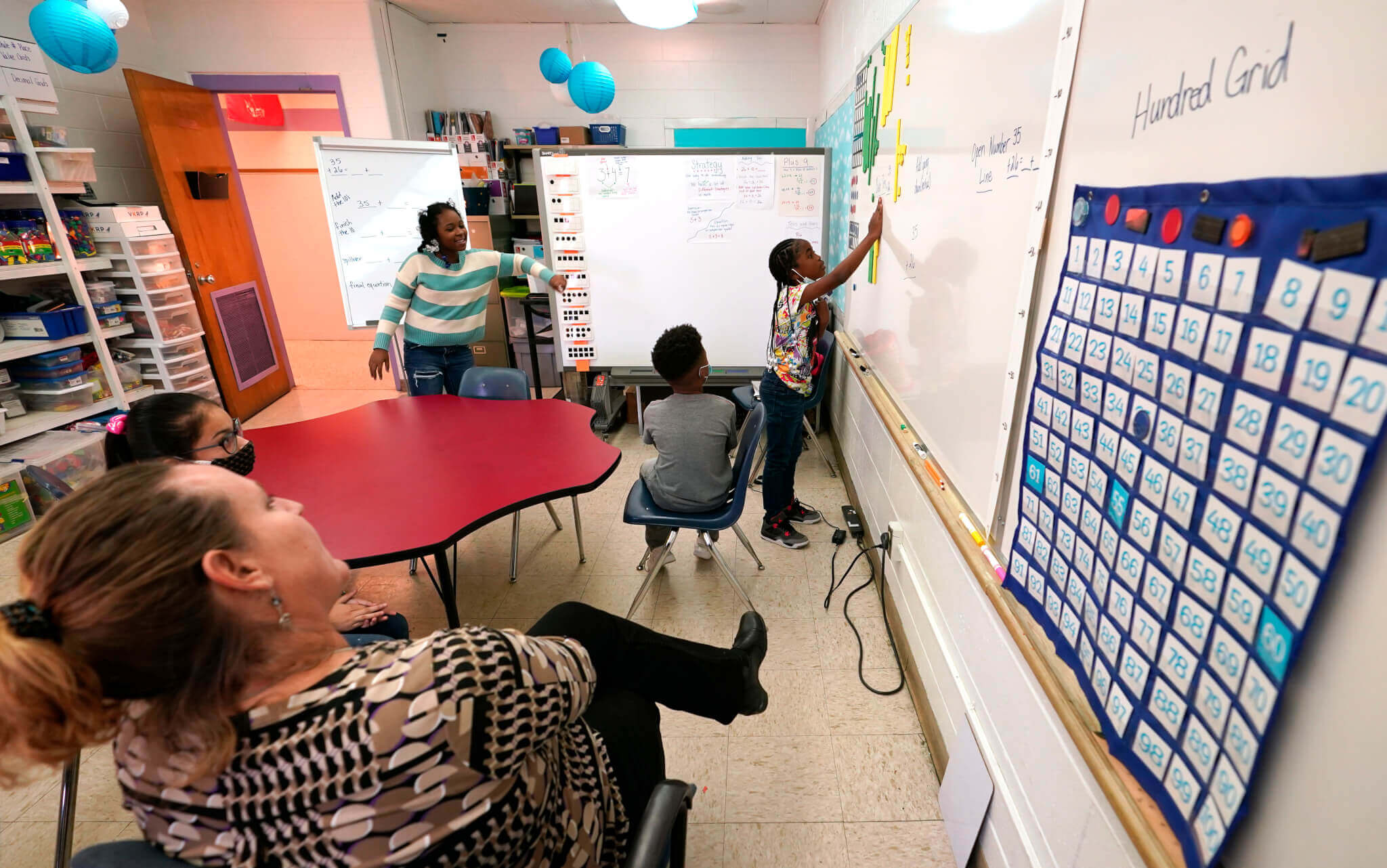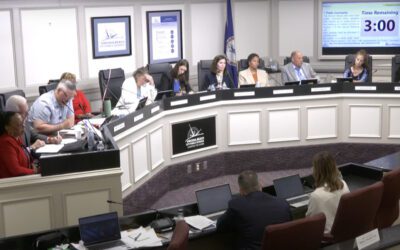
Fourth grade math teacher Martha Commander, left, instructs her class during classes at Chimborazo Elementary School Thursday, Nov. 17, 2022, in Richmond, Va. The Richmond school district, which includes Chimborazo elementary, ultimately decided against year-round school. (AP Photo/Steve Helber)
Virginia’s students are heading back to classrooms, but many school systems remain plagued by teacher shortages.
While the shortage isn’t as severe as it was at the beginning of last school year, it remains sizeable.
According to the Virginia Education Association (VEA), there were about 9,300 open job postings at school divisions across the state on Aug. 10, down from about 10,500 open postings on the same day in 2022.
“There are a ton of openings across the state, and it’s not that much better than it was last year,” said VEA policy analyst Chad Stewart. “We would anticipate continued shortages for almost all positions in the upcoming school year.”
The shortages are not evenly distributed across the state. Some of the largest school divisions, including Fairfax, Loudoun, and Chesterfield counties saw significant improvements in overall staffing. But in Spotsylvania County, the teacher shortage is so acute that more than 600 students are taking math and English classes through an online platform because the school system doesn’t have a licensed teacher to provide in-person instruction.
Over the summer, the Virginia Board of Education took an unprecedented step to try to address the shortage: partnering with a for-profit company that works to fast-track the teacher credentialing process, iteach.
Iteach is accredited by the Council for the Accreditation of Educator Preparation, which credentials traditional educator training programs at colleges and universities. Andrew Rozell, president of certification at iteach, said it is the only for-profit program of its kind with this accreditation.
Some board members reportedly had reservations about the approach, but the board ultimately voted unanimously to approve a three-year pilot program. Iteach’s program includes online courses, after which candidates are placed in classrooms with some supervision.
However, even the fast-tracked program takes about a year to get a candidate “teacher-ready,” meaning that the program won’t help with Virginia’s immediate teacher shortage problem.
Fast-track credentialing programs have myriad critics, including Heather Peske, president of the National Council on Teacher Quality. Peske described online, for-profit teacher training programs as a “blunt instrument” that fails to take into account whether the prospective teachers are qualified for the subjects they will be teaching or whether they will be satisfied enough with their jobs to remain in the profession long-term.
Virginia is already leaning heavily on teachers with provisional licenses to help address the shortage. Provisional licenses are short-term, nonrenewable licenses granted by the Virginia Department of Education for teachers who have some of the required qualifications, but haven’t met all of the state requirements to teach.
A November 2022 report issued by Virginia’s Joint Legislative Audit and Review Commission, which provides nonpartisan analysis and oversight of state agencies, found that the commonwealth issued a total of 8,434 provisional licenses in 2021-22 – a dramatic increase from the average of 6,787 in the years before the COVID-19 pandemic.
Virginia Education Association policy analyst Chad Stewart expressed his organization’s reservations about this increased reliance on teachers who aren’t fully certified.
“For a long time in Virginia, teachers with short-term provisional licenses have played an important role, and this is a totally viable pathway, eventually becoming a fully licensed teacher,” he said. “But the way this licensure is working now — given the magnitude of provisionally licensed teachers that we have — doesn’t necessarily match how it was envisioned.”
While it may not help with this school year’s teacher shortages, the recently announced state budget agreement will direct significant funds towards Virginia’s K-12 school systems.
The budget deal, which will likely win final approval later this week, includes $645 million in additional state funding for public education. Almost $55 million of that will go toward an additional 2% salary bump for public school teachers expected to go into effect Jan. 1, 2024.
A 5% increase was already approved for the coming year, so the new funding will result in an overall 7% salary increase for teachers over the past two years. Additionally, over $152 million will go toward funding more support and instructional positions across all school systems.

Phones off: Hanover Schools’ policy results in 1,600+ confiscations
One school division went all-in on unplugging during the day—and the results are in. Over 1,600 mobile devices were confiscated at Hanover County...

New federal loan limits could derail Virginia students’ path to medical school
This story by Shalina Chatlani was produced by Stateline and reviewed and distributed by Stacker. Twenty-eight-year-old Michaela Bonner has been...

Public school defender Ghazala Hashmi takes on right-wing radio’s Reid for lieutenant governor
Sen. Ghazala Hashmi, a mom of two daughters, is clear about the choice Virginians face when they go to the polls this November. Do they want to...

Myths vs facts about West Nile virus in Virginia
Have you ever wondered how the West Nile virus might impact you? With a case of the West Nile virus confirmed along Virginia's coastal region this...

The Spanberger strategy: Can this Virginia Democrat reset the politics of public education?
This story was originally reported by Mel Leonor Barclay of The 19th. Meet Mel and read more of her reporting on gender, politics and policy. During...

Is Virginia’s #2 Republican trying to wreck your local school? We’ve got the receipts on Winsome Earle-Sears
Here are 4 instances when the Republican running for governor of Virginia has proven she’d make public schools worse. Worried your kid’s school...





